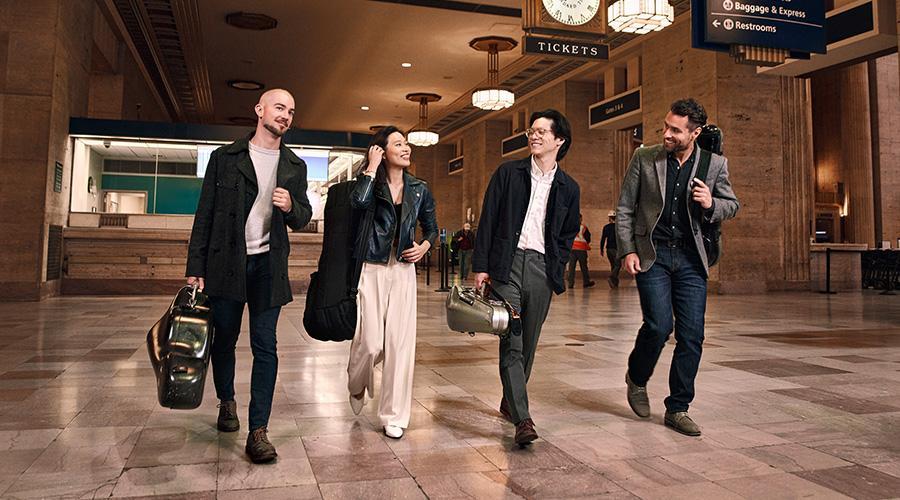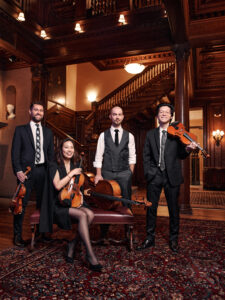
 **** During the opening performance of the 2025 Winter Chamber Music Festival at Northwestern University, the Dover Quartet, comprised of Joel Link and Bryan Lee (violin), Julianne Lee (viola), and Camden Shaw (cello), played music with themes that characterize native America and rural America. The ensemble is currently the Bienen School of Music Quartet-in-Residence, and they gave a splendid concert!
**** During the opening performance of the 2025 Winter Chamber Music Festival at Northwestern University, the Dover Quartet, comprised of Joel Link and Bryan Lee (violin), Julianne Lee (viola), and Camden Shaw (cello), played music with themes that characterize native America and rural America. The ensemble is currently the Bienen School of Music Quartet-in-Residence, and they gave a splendid concert!
The program was introduced by Shaw, who explained that the series should be considered a celebration of music in general and not just chamber music. Then he told us about what we’ll be listening to during tonight’s concert. He started out by saying how “Strum” by Jessie Montgomery was written by a violist who happens to be playing at Northwestern tomorrow night, that is, with Third Coast Percussion. “Strum” started with the pizzicato on viola and emphasized the rural themes of the heartland. Think about the countryside and sparse areas of land in places like Nebraska, Kansas, and the West. You can just imagine the corn growing!
The guest composer on the program was Jerod Tate (a/k/a Jerod Impichchaachaaha’) who greeted us in the language of the Chickasaw Nation and then translated what he said into English. He spoke at length about his music and his biography, explaining how he graduated in music from Northwestern in 1990. Specifically, he talked about how and why he wrote the piece of music called “Woodland Songs” and how it was connected to his being a member of the Chickasaw tribe. He told us something about the history of the Chickasaw, whose original terrain had been the thick forests of what we now call northern Mississippi, western Tennessee, northwestern Alabama, and southwestern Kentucky, that is, before the tribe was forcibly moved to Oklahoma. He explained how the sounds he created were related to the traditional woodland animals and that traditional Chickasaw melodies were intertwined. What would follow were songs (instrumentals) separately having to do with the squirrel, woodpecker, deer, fish, and raccoon. Tate told us that he identified with the raccoon the most, because it was his family clan. The raccoon song was perhaps the most fun and energetic; the deer song was perhaps the most majestic; and you could feel the fish swimming through waves in the fish song. And who could forget the woodpecker pecking and fluttering? As for the squirrel, the music mimics how one moment the creature is happy and the next moment it bites. As a teaser, he played the rattle briefly when he introduced this highly distinctive music.
The next creation was Tate’s new arrangement of a series of songs written by Ulali called “Rattle Songs.” (See, for example, https://www.youtube.com/watch?v=Hc0bI7_yM-o.) In her original version, a rattle was predominant and women were singing, but Tate arranged these melodies for string quartet minus the voices and the rattle. The “Rattle Songs” were in seven parts, which sounded more indigenous towards the beginning (and were given Indian names) while they became more subject to Western influences by the end. For example, “Howheemo” sounds like a horse running in marked contrast to “Grandma’s Easter Lullaby” and “For the People.”
Whereas the first half of the program was devoted to one-of-a-kind contemporary music with American flavors, the entire second half was devoted to Antonín Dvořák’s, String Quartet No. 12 in F Major, Op. 96 (“American”), written in 1893. This piece sounds classical to a modern audience, whereas to an audience of Dvořák’s contemporaries, this would have sounded modern and avant garde. The blue grass and rural themes predominated throughout. The Allegro ma non troppo movement featured a lovely viola solo, and we could hear the fury with lots of viola, mimicked by the violins plus a separate theme played by the cello. In the Lento section, the solo instrument moves from one violin to the other, and we later hear the “bongs” played by the cello. The feel that we get is that of a wide span of country and miles upon miles of open spaces. The quartet played the Motto Vivace movement in a way that resembled Aaron Copland, with all of the fiddling. And the Finale: Vivace ma non troppo section ended lively and bright.
Tate told us earlier that he was excited to work with the Dovers, and the thrill was infectious. The audience gave him and the ensemble a standing ovation. It was an honor to see Tate in person, considering that he is a leading composer of American Indian classical music today and that the “Bienen School co-commissioned Tate’s works on the evening’s program, together with the Curtis Institute of Music and a collective of chamber music presenters around the United States.”
The Dover Quartet performed on Friday, January 10th as part of Northwestern University’s Winter Chamber Music Festival, taking place between January 10-26, 2025, at the Pick-Staiger Concert Hall, 50 Arts Circle Drive, at Northwestern’s Evanston Campus. The festival is in its 28th season, and this was its 172nd concert. There are a lot more events to attend during this year’s series, and you should make it a point to see as many as possible!
Single tickets for the Dovers were $40 for the general public and $15 for students with valid ID.
For more information and to purchase tickets for upcoming events during the 2025 Winter Chamber Music Festival, visit: https://music.northwestern.edu/events.






More Stories
Finding Paul Lisnek
“Mozart and His Mentors”- Music of the Baroque reviewed by Julia W. Rath
Our Milwaukee “Staycation” 2025!